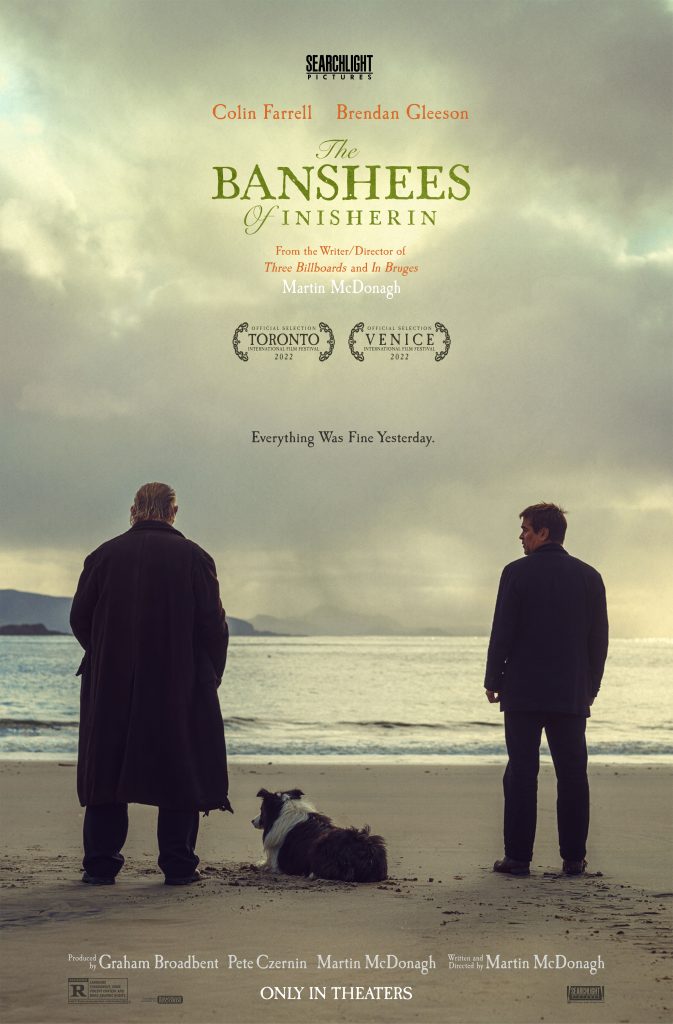In Review: The Banshees of Inisherin
 by Ted Giese
by Ted Giese
Near the end of the Irish civil war in the 1920s just off the west coast of Ireland on the island Inisherin two long time friends suddenly become estranged when folk musician Colm Doherty stops talking to the affable but somewhat oblivious Pádraic Súilleabháin. Pádraic is flummoxed by this abrupt rebuff and has no idea why his friend won’t talk to him. The mystery of why Colm stopped talking to Pádraic and the disturbing events that unfold as a result is the driving force undergirding this dark comedic tragedy.
Brendan Gleeson and Colin Farrell, portraying Colm and Pádraic, turn in tremendous performances full of tension, suspense, and poignant melancholy. Kerry Condon and Barry Keoghan provide equally strong supporting performances as Pádraic’s well-read sister Siobhan Súilleabháin and the socially awkward simpleton Dominic Kearney.
The Banshees of Inisherin depicts small town life in an island community with one pub and one church, meaning everyone knows everyone’s business, making the need for a good reputation paramount. As such, the film provides viewers an excellent meditation on the Eighth Commandment: “You shall not give false testimony against your neighbour.” Luther reminds us that this means “we should fear and love God so that we do not tell lies about our neighbour, betray him, slander him, or hurt his reputation, but defend him, speak well of him, and explain everything in the kindest way.” By contrast, Colm—struggling with despair and feeling time slip away—sacrifices the reputation of his friend Pádraic in order to gain more time to himself to write music—which in turn will improve his own reputation as a fiddle player. Colm’s change of attitude and the local gossip call into question whether Pádraic is nice or dimwitted, throwing the man into a state of existential crisis.
Cut off from Colm, Pádraic ends up spending more time with Dominic whom he nevertheless considers poor company due to Dominic’s dimwitted nature. But beggars can’t be choosers, so Pádraic makes due with this questionable friendship. For his part Dominic, is happy to enter to come closer to Pádraic, as he hopes to form a relationship with Pádraic’s sister Siobhan. Pádraic and Dominic’s strained shallow ‘friendship’ is a kind of reflection of Colm and Pádraic’s prior friendship; the dramatic irony is that the audience can see this but poor Pádraic cannot. Betrayed, hurt, and slandered Pádraic, still seeks to reconcile with Colm—but matters grow worse when Colm threatens to cut off a finger from his left hand, his fiddle hand, with a pair of shears each time Pádraic bothers him.
Colm claims all he wants from Pádraic is silence, to which Siobhan responds, “One more silent man on Inisherin, good-oh! Silence it is, so.” Colm returns: “This isn’t about Inisherin. It’s about one boring man leaving another man alone, that’s all.” In a fit of exasperation, Pádraic’s sister replies: “One boring man! You’re all… boring! With your piddling grievances over nothin’! You’re all… boring! I’ll see he doesn’t talk to you no more.” The Banshees of Inisherin deals with the flipsides of humility and pride, what people think of themselves and what they think of others, and how they are tempted to puff themselves up by tearing others down.
While Christian faith is part of life for the folks of Inisherin, filmmaker martin McDonagh seems to have a pragmatically low opinion of it. This film notwithstanding, however, there is inestimably more consolation available in a congregation where the Word of God and the means of grace in the Sacraments are provided than will ever be found at a pub.
A claustrophobic cloud of despair hangs over all Inisherin. This is represented in a way by the island’s crone, Mrs. McCormick, whose presence and words often portend tragedy; McCormick herself acts as a kind of warning of what Siobhan’s future life will be like if she doesn’t escape the island. But how does someone escape the Island? In good-humoured days of pints and songs at the pub with friends, like Colm and Pádraic formerly enjoyed? Or in death? The theme of suicide looms over the film, and the temptation to suicide is amplified by hopelessness and loneliness. Having friends or a spouse, having the gift of a good reputation, even having a rewarding job can help provide a remedy for the sort of despair The Banshees of Inisherin digs into. But when the folks on Inisherin lose hope, their minds turn to death. Suicide becomes the pestilence that stalks in darkness, the destruction that wastes at noonday (Psalm 91:6).
The Christian faced with these temptations is best served by retreating to the community of the church and turning to God for comfort and peace. And while the film depicts a local Roman Catholic congregation in Inisherin, it’s mainly there for laughs not for solace. The character of the parish priest says mass and hears confession, but the church is not really a beacon of forgiveness and comfort; it’s just another local source for gossip. Colm and Pádraic and Siobhan and Dominic do not find peace in the chalice of the Lord’s Supper any more than they find it in the sherry or pints served at the pub.
Peel back the surface of humour and lurking beneath the placid waters and green pastures of Inisherin is the fallen nature of mankind deeply in need of redemption. But viewers will have to provide their own hope of redemption; McDonagh gives no reprieve from the despair.
While Christian faith is part of life for the folks of Inisherin, filmmaker martin McDonagh seems to have a pragmatically low opinion of it. This film notwithstanding, however, there is inestimably more consolation available in a congregation where the Word of God and the means of grace in the Sacraments are provided than will ever be found at a pub. If Colm and Pádraic and Siobhan and Dominic, or even Mrs. McCormick for that matter, all found their peace in Christ, and by extension in each other as brothers and sisters in Christ, then The Banshees of Inisherin would be a different kind of film. But this film is a tragedy.
What should we make of the film’s title? In a pivotal bit of dialogue, Colm says this is the name of a tune he’s writing, but Pádraic is incredulous, believing there are no banshees on Inisherin. Colm replies: “I don’t think they scream to portend death anymore, maybe they just sit back, amused, and observe.” This suggests that there may in fact be a spiritual dimension to the oppression and despair plaguing the folks of Inisherin—one that they aren’t wholly aware of. In Irish folklore, banshees were female spirits whose wailing presaged the death of a family member. Winks and nods to this belief are peppered throughout the film, but Colm’s idea of the silent banshee finds confirmation in the final scene of the movie, just before McDonagh cuts to one last aerial shot of the island.
 For adult viewers tired of trite agenda-driven spectacles, The Banshees of Inisherin provides a thoughtful introspective experience. It takes friendship and loneliness seriously, and provides an honest exploration of how “desire when it has conceived gives birth to sin, and sin when it is fully grown brings forth death” (James 1:15). This is not light escapism. Peel back the surface of humour and lurking beneath the placid waters and green pastures of Inisherin is the fallen nature of mankind deeply in need of redemption. But viewers will have to provide their own hope of redemption; McDonagh gives no reprieve from the despair. Consequently, The Banshees of Inisherin may be too dark for those already struggling to cope with the harshness of life.
For adult viewers tired of trite agenda-driven spectacles, The Banshees of Inisherin provides a thoughtful introspective experience. It takes friendship and loneliness seriously, and provides an honest exploration of how “desire when it has conceived gives birth to sin, and sin when it is fully grown brings forth death” (James 1:15). This is not light escapism. Peel back the surface of humour and lurking beneath the placid waters and green pastures of Inisherin is the fallen nature of mankind deeply in need of redemption. But viewers will have to provide their own hope of redemption; McDonagh gives no reprieve from the despair. Consequently, The Banshees of Inisherin may be too dark for those already struggling to cope with the harshness of life.
———————
Rev. Ted Giese is lead pastor of Mount Olive Lutheran Church, Regina, Saskatchewan, Canada; a contributor to The Canadian Lutheran, Reporter; and movie reviewer for the “Issues, Etc.” radio program. For more of his television and movie reviews, check out the Lutheran Movie Review Index.



